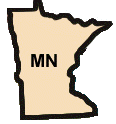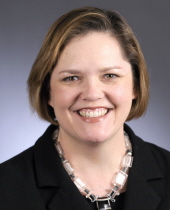What’s In a Name? Could Scrabble Scores Determine Minnesota’s Next Governor?
Gubernatorial candidates with longer names and names with letters totaling higher Scrabble tile values are nearly twice as likely to win general election races throughout Minnesota history

Name recognition is known to play an important role in determining voter candidate preferences, particularly in early polling matchups.
Familiarity with the candidates, for example, is one of the reasons why Mark Dayton (and Norm Coleman) led their respective fields in recent Rasmussen polling of DFL and GOP preferences for likely Minnesota voters (Coleman never even entered the race). It is also part of the reason why candidates such as Hillary Clinton and Rudy Giuliani got off to such fast starts in their respective 2008 presidential campaigns.
But what do the names of Minnesota Governors such as William Merriam, Adolph Eberhart, J.A.A. Burnquist, Theodore Christianson, and Luther Youngdahl have in common?
They not only went 12 and 0 in gubernatorial election contests in the Gopher State, but they also have names that were longer than their general election opponents and, if the board game Scrabble scored proper nouns, they would have also trounced their rivals in that contest as well.
A Smart Politics analysis of Minnesota’s 64 gubernatorial races finds that those candidates with more unusual letters (those scoring higher points in Scrabble) and those with longer names win at nearly twice the rate as their closest opponent.
In total, 41 of the governors elected to the Gopher State have first and last names with higher Scrabble scores than their opponents, or a 64.1 percent rate of victory.
Candidates with more common letters comprising their names won only 22 elections, or 34.4 percent of the time. (The 1863 matchup between Stephen Miller and Henry Welles would have resulted in a Scrabble tie, at 20-20).
Governors such as John Johnson (31 points), John Pillsbury (30 points), Alexander Ramsey (28 points), Winfield Hammond (30 points), Adolph Eberhart (25 points), J.A.A. Burnquist (30 points), Theodore Christianson (29 points), and Luther Youngdahl (26 points) collectively notched not only a 19-1 electoral record, but also an 18-2 mark on the Scrabble board against their opponents.

On the Republican side, the best the GOP can offer up, excepting long-shot Phil Herwig (22 points), is Marty Seifert whose name scores a 20 on the Scrabble board – besting chief rival Tom Emmer by six points.
The Minnesota Governor whose name has the lowest Scrabble score is Arne Carlson. At just 13 points, Carlson was able to defeat Rudy Perpich (24) and John Marty (24).
Defeated 1982 Republican nominee Wheelock Whitney (36 points) has the honor of having the name with the highest Scrabble score of any first or second place gubernatorial candidate.
Of course, Scrabble does not count proper nouns in its rules of play. Moreover, a letter which might be unusual in non-proper nouns (such as “J”) is much more common in names (e.g. John Johnson).
That being the case, Smart Politics also examined the length (number of characters) of names and found a similar pattern: gubernatorial candidates with longer names won at nearly twice the rate (36 victories, 56.3 percent) as those with shorter names (20, 31.3 percent).
(In eight instances, 12.5 percent of elections, the two leading candidates had the same number of characters in their names).
So while name recognition has long been established as an important factor in political campaigns, perhaps longer names or names with unusual letters likewise stand apart from the crowd in the mind of the voter.
Minnesota Gubernatorial Elections by Scrabble Score, 1857-2006
|
Year
|
Winner
|
Score
|
Loser
|
Score
|
|
1857
|
Henry Sibley
|
22
|
Alexander Ramsey
|
28
|
|
1859
|
Alexander Ramsey
|
28
|
George Becker
|
22
|
|
1861
|
Alexander Ramsey
|
28
|
E.O. Hamblin
|
16
|
|
1863
|
Stephen Miller
|
20
|
Henry Welles
|
20
|
|
1865
|
William Marshall
|
25
|
Henry Rice
|
17
|
|
1867
|
William Marshall
|
25
|
Charles Flandrau
|
24
|
|
1869
|
Horace Austin
|
17
|
George Otis
|
12
|
|
1871
|
Horace Austin
|
17
|
Winthrop Young
|
25
|
|
1873
|
Cushman Davis
|
23
|
Ara Barton
|
11
|
|
1875
|
John Pillsbury
|
30
|
David Buell
|
17
|
|
1877
|
John Pillsbury
|
30
|
William Banning
|
22
|
|
1879
|
John Pillsbury
|
30
|
Edmund Rice
|
16
|
|
1881
|
Lucius Hubbard
|
23
|
Richard Johnson
|
30
|
|
1883
|
Lucius Hubbard
|
23
|
Adolph Biermann
|
24
|
|
1886
|
Andrew McGill
|
21
|
Albert Ames
|
14
|
|
1888
|
William Merriam
|
23
|
Eugene Wilson
|
16
|
|
1890
|
William Merriam
|
23
|
Thomas Wilson
|
20
|
|
1892
|
Knute Nelson
|
15
|
Daniel Lawler
|
16
|
|
1894
|
Knute Nelson
|
15
|
Sidney Owen
|
17
|
|
1896
|
David Clough
|
22
|
John Lind
|
19
|
|
1898
|
John Lind
|
19
|
William Eustis
|
18
|
|
1900
|
Samuel Van Sant
|
18
|
John Lind
|
19
|
|
1902
|
Samuel Van Sant
|
18
|
Leonard Rosing
|
15
|
|
1904
|
John Johnson
|
31
|
Robert Dunn
|
13
|
|
1906
|
John Johnson
|
31
|
A.L. Cole
|
8
|
|
1908
|
John Johnson
|
31
|
Jacob F. Jacobson
|
35
|
|
1910
|
Adolph Eberhart
|
25
|
James Gray
|
22
|
|
1912
|
Adolph Eberhart
|
25
|
Peter Ringdahl
|
20
|
|
1914
|
Winfield Hammond
|
30
|
William Lee
|
15
|
|
1916
|
J.A.A. Burnquist
|
30
|
Thomas Dwyer
|
23
|
|
1918
|
J.A.A. Burnquist
|
30
|
David Evans
|
18
|
|
1920
|
J.A.O. Preus
|
17
|
Henrik Shipstead
|
28
|
|
1922
|
J.A.O. Preus
|
17
|
Magnus Johnson
|
26
|
|
1924
|
Theodore Christianson
|
29
|
Floyd Olson
|
17
|
|
1926
|
Theodore Christianson
|
29
|
Magnus Johnson
|
26
|
|
1928
|
Theodore Christianson
|
29
|
Ernest Lundeen
|
14
|
|
1930
|
Floyd Olson
|
17
|
Raymond Chase
|
23
|
|
1932
|
Floyd Olson
|
17
|
Earle Brown
|
15
|
|
1934
|
Floyd Olson
|
17
|
Martin Nelson
|
14
|
|
1936
|
Elmer Benson
|
15
|
Martin Nelson
|
14
|
|
1938
|
Harold Stassen
|
17
|
Elmer Benson
|
15
|
|
1940
|
Harold Stassen
|
17
|
Hjalmer Petersen
|
29
|
|
1942
|
Harold Stassen
|
17
|
Hjalmer Petersen
|
29
|
|
1944
|
Edward Thye
|
21
|
Byron Allen
|
15
|
|
1946
|
Luther Youngdahl
|
26
|
Harold Barker
|
22
|
|
1948
|
Luther Youngdahl
|
26
|
Charles Halsted
|
23
|
|
1950
|
Luther Youngdahl
|
26
|
Harry Peterson
|
21
|
|
1952
|
C. Elmer Anderson
|
19
|
Orville Freeman
|
22
|
|
1954
|
Orville Freeman
|
22
|
C. Elmer Anderson
|
19
|
|
1956
|
Orville Freeman
|
22
|
Ancher Nelsen
|
17
|
|
1958
|
Orville Freeman
|
22
|
George MacKinnon
|
25
|
|
1960
|
Elmer Andersen
|
16
|
Orville Freeman
|
22
|
|
1962
|
Karl Rolvaag
|
19
|
Elmer Andersen
|
16
|
|
1966
|
Harold LeVander
|
22
|
Karl Rolvaag
|
19
|
|
1970
|
Wendell Anderson
|
20
|
Douglas Head
|
17
|
|
1974
|
Wendell Anderson
|
20
|
John Johnson
|
31
|
|
1978
|
Al Quie
|
15
|
Rudy Perpich
|
24
|
|
1982
|
Rudy Perpich
|
24
|
Wheelock Whitney
|
36
|
|
1986
|
Rudy Perpich
|
24
|
Carl Ludeman
|
16
|
|
1990
|
Arne Carlson
|
13
|
Rudy Perpich
|
24
|
|
1994
|
Arne Carlson
|
13
|
John Marty
|
24
|
|
1998
|
Jesse Ventura
|
22
|
Norm Coleman
|
17
|
|
2002
|
Tim Pawlenty
|
21
|
Roger Moe
|
11
|
|
2006
|
Tim Pawlenty
|
21
|
Mike Hatch
|
23
|
Follow Smart Politics on Twitter.
